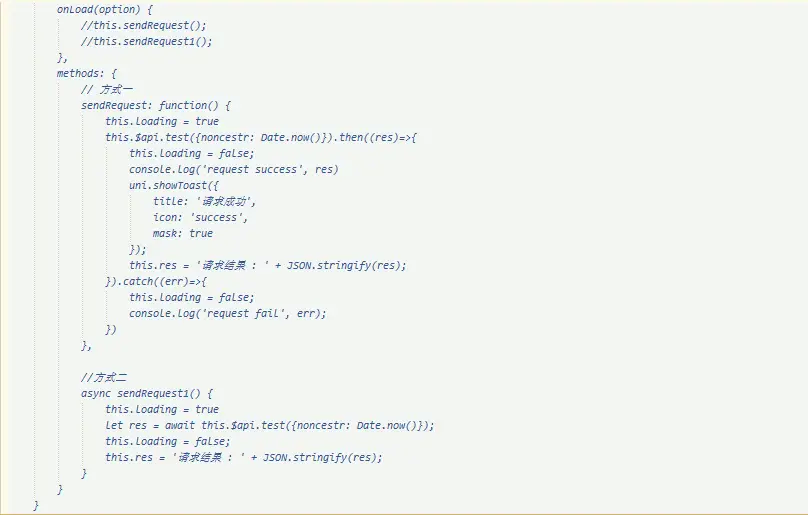平台兼容性
插件使用说明
- 基于 Promise 对象实现更简单的 request 使用方式,支持请求和响应拦截
- 下载后把 vmeitime-http 文件夹 copy 到项目 common/ 目录下
1. 配置
1.1 全局配置修改(修改vmeitime-http/interface.js中config和interceptor)
config: {
baseUrl: "https://api.com/api/",
header: {
'Content-Type':'application/json;charset=UTF-8',
'Content-Type':'application/x-www-form-urlencoded'
},
dataType: "json",
responseType: "text"
},
interceptor: {
request: null,
response: null
}1.2 具体接口调用时修改(在vmeitime-http/index.js文件中具体业务接口中配置)
//设置baseUrl
http.config.baseUrl = "http://localhost:8080/api/"
//设置请求前拦截器
http.interceptor.request = (config) => {
//添加通用参数
config.header = {
"token": "xxxxxxxxxxxxxxxxxxxxxxxxxxxxxx"
}
}
//设置请求结束后拦截器
http.interceptor.response = (response) => {
//判断返回状态 执行相应操作
return response;
}2. 使用
2.1 全局使用(在main.js注册)
import api from '@/common/vmeitime-http/'
// 全局挂载后使用
Vue.prototype.$api = api
<template>
<view class="content">
<view class="uni-padding-wrap uni-common-mt">
<view class="uni-textarea uni-common-mt">
<textarea :value="res"></textarea>
</view>
<view class="uni-btn-v uni-common-mt">
<button type="primary" @click="sendRequest" :loading="loading">发起请求</button>
<button type="default" @click="sendRequest1" :loading="loading">发起请求(async/await)</button>
</view>
</view>
</view>
</template>
<script>
export default {
data() {
return {
loading: false,
res: ''
}
},
onLoad(option) {
//this.sendRequest();
//this.sendRequest1();
},
methods: {
// 方式一
sendRequest: function() {
this.loading = true
this.$api.test({noncestr: Date.now()}).then((res)=>{
this.loading = false;
console.log('request success', res)
uni.showToast({
title: '请求成功',
icon: 'success',
mask: true
});
this.res = '请求结果 : ' + JSON.stringify(res);
}).catch((err)=>{
this.loading = false;
console.log('request fail', err);
})
},
//方式二 https://segmentfault.com/a/1190000013292562?utm_source=channel-newest
async sendRequest1() {
this.loading = true
let res = await this.$api.test({noncestr: Date.now()});
this.loading = false;
this.res = '请求结果 : ' + JSON.stringify(res);
}
}
}
</script>2.2 局部使用(局部使用,不需要在 main.js 中注册)
<template>
<view class="content">
<view class="uni-padding-wrap uni-common-mt">
<view class="uni-textarea uni-common-mt">
<textarea :value="res"></textarea>
</view>
<view class="uni-btn-v uni-common-mt">
<button type="primary" @click="sendRequest" :loading="loading">发起请求</button>
<button type="default" @click="sendRequest1" :loading="loading">发起请求(async/await)</button>
</view>
</view>
</view>
</template>
<script>
import api from '@/common/vmeitime-http/'
export default {
data() {
return {
loading: false,
res: ''
}
},
onLoad(option) {
//this.sendRequest();
//this.sendRequest1();
},
methods: {
// 方式一
sendRequest: function() {
this.loading = true
api.test({noncestr: Date.now()}).then((res)=>{
this.loading = false;
console.log('request success', res)
uni.showToast({
title: '请求成功',
icon: 'success',
mask: true
});
this.res = '请求结果 : ' + JSON.stringify(res);
}).catch((err)=>{
this.loading = false;
console.log('request fail', err);
})
},
//方式二
async sendRequest1() {
this.loading = true
let res = await this.api.test({noncestr: Date.now()});
this.loading = false;
this.res = '请求结果 : ' + JSON.stringify(res);
}
}
}
</script>
3. 接口数据加密、接口签名核验
在vmeitime-http/interface.js文件中的request(Object)方法中补充修改相应的代码
4. 接口请求/响应日志记录
在vmeitime-http/interface.js文件中的request(Object)方法中补充修改相应的代码
5. 业务相关接口编写
在vmeitime-http/index.js文件中的编写具体业务相关的接口,参考test()方法


 收藏人数:
收藏人数:
 下载插件并导入HBuilderX
下载插件并导入HBuilderX
 下载插件ZIP
下载插件ZIP
 赞赏(3)
赞赏(3)

 下载 18688
下载 18688
 赞赏 3
赞赏 3

 下载 9692401
下载 9692401
 赞赏 1528
赞赏 1528















 赞赏
赞赏
 京公网安备:11010802035340号
京公网安备:11010802035340号